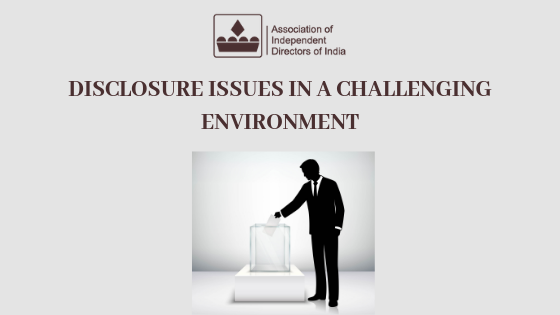The absence of effective Corporate Governance leads to chronic informational asymmetry between Organizations and their Stakeholders. These stakeholders may be the Government, Vendors, Employees, Customers, Shareholders, amongst others, having a firm grip on the overall successes of the entity, making it crucial to maintain an acceptable degree of transparency when it comes to communicating important decisions and the basis on which they were made. Synergies can be developed only when trust prevails among the acting parties and this can be assured by means of effective, relevant and true informational disclosure. Responsible organizations seek to communicate their performance & governance, eventually paving way for a lasting goodwill. When an entity is consistently publishing its reports and putting out all negatives and positives, it benefits by:
- SHAREHOLDERS VALUE CREATION- Studies suggest that timely disclosure creates definitive value for shareholders. The more a firm is transparent, the more it will be likely to get financed externally, reducing its cost of capital.
- IMPROVEMENT IN INFORMATION HELD BY THIRD PARTIES- A well governed firm provides its stakeholders with relevant and true information. This aids the stakeholders to have realistic expectations from the entity.
- INVESTORS BEHAVIOUR- Increased degree of disclosure reduces information asymmetries and improves the volume of informed trading. This in turn increases liquidity, attracting investors to the market.
- CHANGE IN MANAGERIAL BEHAVIOUR AND BETTER GOVERNANCE-Increased degree of disclosure leads to a more regulated model of Corporate Governance. Thus, behavioral makeover of the management is highly likely, as they become more responsible and make informed decisions.
CORPORALITY FOR SHAREHOLDERS: FINANCIAL SUSTAINIBILITY
In financial context, a piece of information is said to be material when it is likely to alter the investment decisions of a rational investor. Under the current legal and accounting frameworks, material information must be reported in the financial statements of publically listed companies, but what is material in a sustainability context may not be seen as material in a financial one. As a rising number of mainstream investors are expressing interest in the sustainability performance of the companies in their portfolios, this disconnect possesses a serious problem. Sustainable practices and their effects must also be incorporated in the information being put out.
MARKET DISCIPLINE: DRIVEN BY TRANSPARENCY?
Watching rivals going transparent with their approach and processes, competitor firms trigger a wave of awareness amongst themselves for providing the right groups with the right bites of information. Becoming aware of their responsibilities, firms move towards the accumulation of a common market discipline. Such practices ultimately eliminate frauds and scams.
These include both Voluntary and Mandatory disclosures, where the former stems out of self-regulation and stakeholder’s requirements, and the latter due to legislations and government regulation.
MANIPULATION IN DISCLOSURE: TOO MUCH OR TOO LESS INFORMATION
Even though disclosure is increasingly becoming more prominent, there still is a lot of manipulation from organizations. It remains as a question as to what is the appropriate amount of disclosure. Many laws do not provide clarity on what aspects of information are to be disclosed and what is to be concealed. This enables the entities to not reveal some bitter but true facts, which might be vital to certain stakeholders. Furthermore, the relevance of information is not similar for every stakeholder. In simpler terms, a financial analyst will not be interested in the Human Resource Development Report. This points at some amount of manipulation.
However, the oldest and best-known form of manipulation pertains to that of accounts. In order to present falsified financial accounts, stats and numbers are dressed by unmatched creative accountants. All this is done to reveal a favorable balance sheet; at the cost of long-term plans and public image. Safe to say that such practices often lead to turmoil and irreversible corporate frauds.
CONCLUSION
With the emergence of stakeholders’ protectionism, the corporate world is now responsible not only to the shareholders, who have invested their funds in the companies, but also to all stakeholders who are affected from corporate activities. It is evident that corporate operations have economic as well as social impacts. Financial reporting is carried out with regard to economic activities and its results on a firm. Whereas, social reporting is a broader concept, shedding light on a corporate’s social responsibilities. Achieving economies is a must for any organization, but at the same time due consideration must be given to the general public whose resources are at stakes. Right to Corporate disclosure is basic to the needs of all stakeholders and organizations must ensure timely disclosure of relevant and true information to support a healthy corporate ecosystem in the country.

